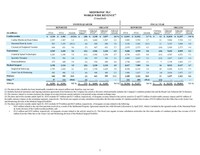Week In Review: Reflecting On Past Failures

Table of Contents
Identifying Key Failures from the Past Week
The first step in this week in review is to honestly assess the past week's performance. Identifying your failures requires self-awareness and a willingness to confront areas needing improvement. Don't shy away from acknowledging mistakes; embrace them as opportunities for growth. Effective failure analysis begins with a structured approach:
- Review your calendar and to-do lists from the past week. This provides a factual record of your activities and commitments.
- Identify tasks or projects that didn't go as planned. Be specific; instead of "the project was behind schedule," note exactly what caused the delay and by how much.
- Pinpoint specific moments or decisions that led to the failures. Was it procrastination? Poor communication? Lack of planning? The more precise you are, the better your analysis will be.
- Be honest with yourself; avoid blaming external factors unnecessarily. While external factors can certainly impact outcomes, focusing on what you can control is key to improvement.
- Use a structured approach to document your findings. A simple journal entry or spreadsheet can help you organize your thoughts and track progress. Consider using a dedicated app for this.
Analyzing the Root Causes of Past Failures
Identifying a failure is only the first step. To truly learn from your mistakes, you need to conduct a thorough root cause analysis. This involves digging deeper than surface-level observations to uncover the underlying issues. Avoid simply stating the problem; ask why it happened repeatedly. This "5 Whys" technique can be incredibly effective:
- Ask "why" repeatedly to uncover the underlying causes of each failure. For example, "Why was the project late? Because we underestimated the time required. Why did we underestimate the time? Because we lacked experience with that specific task. Why did we lack experience? Because we didn't seek training."
- Consider external factors (e.g., lack of resources, unexpected events), but focus on areas you can control. You can't control everything, but you can control your reactions and how you approach challenges.
- Identify patterns in your mistakes; are there recurring issues? Recognizing recurring patterns helps to address systematic problems rather than individual incidents.
- Avoid emotional responses; maintain a critical and analytical approach. Emotional responses can cloud your judgment and prevent you from identifying the true causes of your failures.
- Document your analysis thoroughly. Keep detailed notes on your findings to inform your improvement strategies.
Developing Strategies for Future Improvement Based on Past Failures
Once you've identified and analyzed your failures, it's time to translate those insights into actionable steps. This involves creating concrete strategies to prevent similar setbacks in the future. Focus on creating SMART goals – Specific, Measurable, Achievable, Relevant, and Time-bound:
- For each failure, brainstorm at least three potential solutions. Don't settle for the first idea that comes to mind; explore various options.
- Develop a plan to implement those solutions, setting deadlines. Make your plan as detailed as possible to ensure accountability.
- Identify resources or skills you might need to develop to prevent future failures. This might involve taking a course, seeking mentorship, or investing in new tools.
- Consider seeking mentorship or feedback from others. A fresh perspective can often illuminate blind spots in your analysis.
- Schedule regular "week in review" sessions to track progress. Make this a habit to ensure continuous improvement.
The Power of a Growth Mindset in Overcoming Failures
A crucial element of successfully navigating setbacks is cultivating a growth mindset. This involves viewing failures not as personal shortcomings but as opportunities for learning and development. Individuals with a growth mindset believe their abilities and intelligence can be developed through dedication and hard work. This fosters resilience and allows you to approach future challenges with a positive attitude and unwavering self-belief. Embrace challenges, learn from criticism, find inspiration in the success of others, and persist in the face of setbacks.
Conclusion
This week in review highlighted the importance of reflecting on past failures as a critical step in personal and professional growth. By consistently identifying failures, analyzing their root causes, and developing effective improvement strategies, you can transform setbacks into stepping stones to success. Start your weekly failure reflection today! Implement a regular "week in review" process for lasting personal growth. Transform your past failures into future success through consistent self-reflection and the development of a growth mindset.

Featured Posts
-
 Ensino Superior 4 Cursos Do Vale E Regiao Conquistam Nota Maxima No Mec
May 17, 2025
Ensino Superior 4 Cursos Do Vale E Regiao Conquistam Nota Maxima No Mec
May 17, 2025 -
 The Ultimate Guide To Federal Student Loan Refinancing
May 17, 2025
The Ultimate Guide To Federal Student Loan Refinancing
May 17, 2025 -
 Zhevago Posledstviya Ugrozy Prekrascheniya Investitsiy Ferrexpo Dlya Ukrainy
May 17, 2025
Zhevago Posledstviya Ugrozy Prekrascheniya Investitsiy Ferrexpo Dlya Ukrainy
May 17, 2025 -
 Japans Steep Yield Curve A Growing Concern For Investors And The Economy
May 17, 2025
Japans Steep Yield Curve A Growing Concern For Investors And The Economy
May 17, 2025 -
 Inversionistas De Koriun Cuando Se Descongelaran Sus Cuentas
May 17, 2025
Inversionistas De Koriun Cuando Se Descongelaran Sus Cuentas
May 17, 2025
Latest Posts
-
 40
May 17, 2025
40
May 17, 2025 -
 13 Analysts Rate Principal Financial Group Nasdaq Pfg What Investors Need To Know
May 17, 2025
13 Analysts Rate Principal Financial Group Nasdaq Pfg What Investors Need To Know
May 17, 2025 -
 Understanding Principal Financial Group Pfg Key Insights From 13 Analyst Reports
May 17, 2025
Understanding Principal Financial Group Pfg Key Insights From 13 Analyst Reports
May 17, 2025 -
 Update On Valerio Therapeutics S A S 2024 Financial Report Publication
May 17, 2025
Update On Valerio Therapeutics S A S 2024 Financial Report Publication
May 17, 2025 -
 Principal Financial Group Stock In Depth Analysis From 13 Analysts
May 17, 2025
Principal Financial Group Stock In Depth Analysis From 13 Analysts
May 17, 2025
